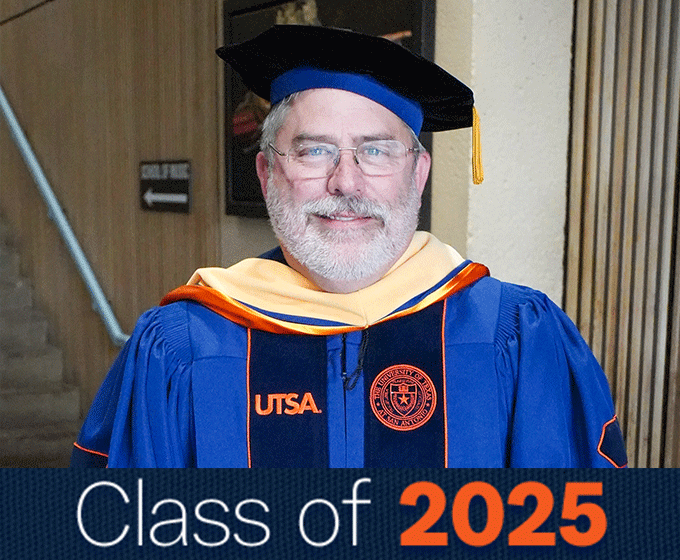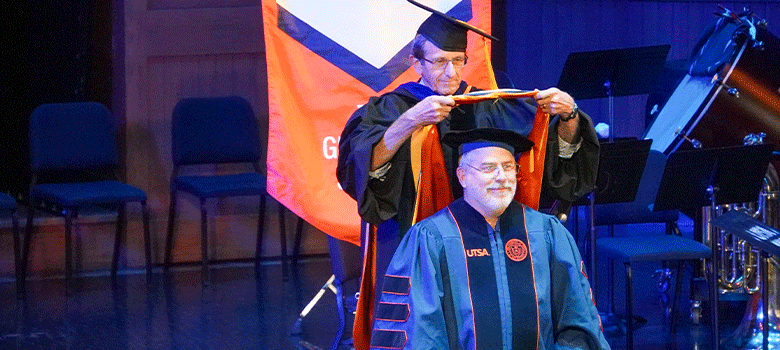
MAY 17, 2025 — Clint McKenzie’s journey to a doctoral degree has been anything but typical. After retiring from a 20-year career with the City of San Antonio and working full-time as a project archaeologist and archival researcher with the UTSA Center for Archaeological Research (CAR), McKenzie pursued a lifelong goal of earning a doctorate in anthropology from UTSA.
A San Antonio resident since he was three years of age, McKenzie’s connection to UTSA runs deep. He earned his undergraduate degree in anthropology from the university in 1990 and has been involved with CAR in various ways for nearly 50 years, first as a student volunteer and most recently as a staff archaeologist.
“I’ve lived here all my life, and I love San Antonio,” McKenzie said. “UTSA was a known quantity for me in a good way. I knew the program. I knew the faculty. The opportunity to work with the faculty, especially my mentor Dr. Robert Hard, and to be based at the Center gave me the chance to write and publish while doing meaningful research.”

Clint McKenzie was officially hooded during the 2025 Doctoral Conferral Ceremony on May 15.
McKenzie’s dissertation is a detailed historical demographic study of early San Antonio populations. Using tens of thousands of sacramental records, he reconstructed data from the 18th and early 19th centuries to uncover how the population functioned, survived and grew.
“I logged almost 8,600 hours on this dissertation,” he said. “And I still love it. It’s this incredibly complex puzzle. You get to see what happens when you start aggregating all this data. It starts telling you something larger about people and communities.”
At the heart of his work is immigration, that describes people who moved to San Antonio during its early years. While the frontier city depended heavily on incoming soldiers and settlers in the eighteenth century, by the century’s end a shift began. More residents were born locally than arrived from elsewhere.
“You see how opportunity, land access and policies either encouraged or discouraged people from settling here,” he explained. “It’s a story of tradeoffs. Controlling land and resources preserved some communities but limited broader growth.”
As for what comes next, McKenzie is eager to make his research more accessible to others, especially genealogists and local historians.
“While there are genealogies for some of San Antonio’s prominent early families, the majority of residents are not in those records. I’ve captured everyone I could find,” he said. “We are working on ways to publish this so people can easily see what records their ancestors appear in and where to find the original documents. It is not just for scholars. This is for anyone who wants to understand where they come from.”
For students considering UTSA’s anthropology program, McKenzie points to a rare opportunity.
“If you are interested in archaeology or anthropology as a career, there are very few places that have what we have here at UTSA,” he said. “UTSA’s Center for Archaeological Research is a powerhouse for cultural resource management. Being able to work there while studying is a pretty good deal.”
Now officially hooded, McKenzie shows no signs of slowing down.
“The idea of not being busy scares me,” he said. “I have a lot of plans including potentially turning my dissertation research into a book, and I am pretty good about making sure my plans come to fruition.”
UTSA Today is produced by University Communications and Marketing, the official news source of The University of Texas at San Antonio. Send your feedback to news@utsa.edu. Keep up-to-date on UTSA news by visiting UTSA Today. Connect with UTSA online at Facebook, Twitter, Youtube and Instagram.
Move In To COLFA is strongly recommended for new students in COLFA. It gives you the chance to learn about the Student Success Center, campus resources and meet new friends!
Academic Classroom: Lecture Hall (MH 2.01.10,) McKinney Humanities BldgWe invite you to join us for Birds Up! Downtown, an exciting welcome back event designed to connect students with the different departments at the Downtown Campus. Students will have the opportunity to learn about some of the departments on campus, gain access to different resources, and collect some giveaways!
Bill Miller PlazaCome and celebrate this year's homecoming at the Downtown Campus with food, games, giveaways, music, and more. We look forward to seeing your Roadrunner Spirit!
Bill Miller PlazaThe University of Texas at San Antonio is dedicated to the advancement of knowledge through research and discovery, teaching and learning, community engagement and public service. As an institution of access and excellence, UTSA embraces multicultural traditions and serves as a center for intellectual and creative resources as well as a catalyst for socioeconomic development and the commercialization of intellectual property - for Texas, the nation and the world.
To be a premier public research university, providing access to educational excellence and preparing citizen leaders for the global environment.
We encourage an environment of dialogue and discovery, where integrity, excellence, respect, collaboration and innovation are fostered.